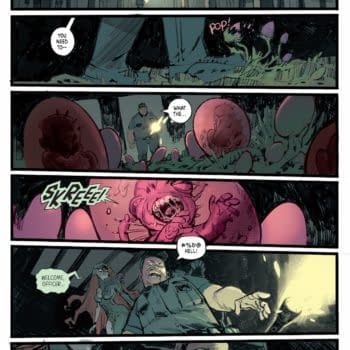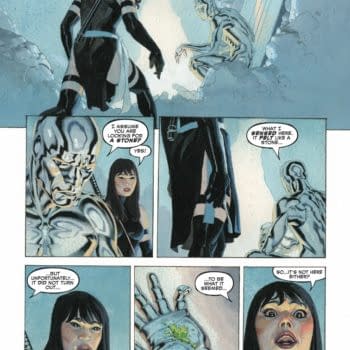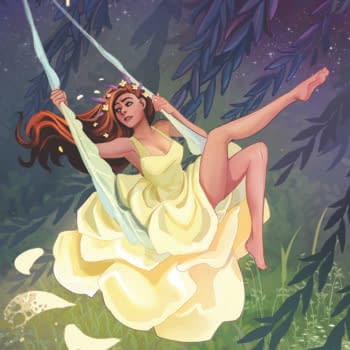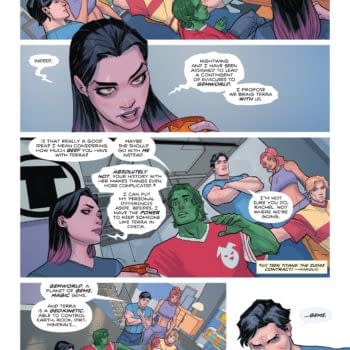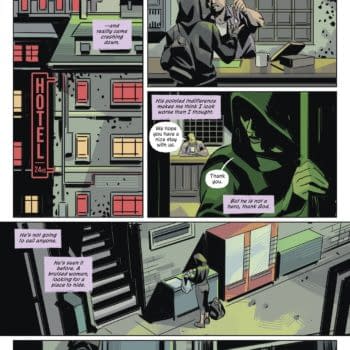Posted in: Comics | Tagged: Comics, comixology, david gabriel, diamond, diversity, lcs, Local Comic Shops, marvel, representation matters, retailers, sales figures, the direct market
Direct Market vs. Diversity: Another Look At The Issue
As Bleeding Cool has been breaking down and reporting in small, easily digestible chunks for readers from an extensive report from the Marvel Retailer Summit with ICv2 this weekend, Marvel has laid some of the blame for the comics sales slump, and presumably perceived weaker performance in their own sales, at the foot of the push for diversity of representation in comics.
David Gabriel, Marvel's Senior Vice President of Sales and Marketing, had said candidly at the recent summit,
Part of it, but I think also it seemed like tastes changed, because stuff you had been doing in the past wasn't working the same way. Did you perceive that or are we misreading that?
No, I think so. I don't know if those customers with the tastes that had been around for three years really supporting nearly anything that we would try, anything that we would attempt, any of the new characters we brought up, either they weren't shopping in that time period, or maybe like you said their tastes have changed.There was definitely a sort of nose-turning at the things that we had been doing successfully for the past three years, no longer viable. We saw that, and that's what we had to react to. Yes, it's all of that.
Gabriel has since walked back on these comments somewhat, after a massive backlash.
Discussed candidly by some of the retailers at the summit, we heard that some were not happy with the false abandonment of the core Marvel heroes and, contrary to what some said about characters "not working," the sticking factor and popularity for a majority of these new titles and characters like Squirrel Girl, Ms. Marvel, The Mighty Thor, Spider-Gwen, Miles Morales, and Moon Girl, continue to prove that our fans and retailers ARE excited about these new heroes. And let me be clear, our new heroes are not going anywhere! We are proud and excited to keep introducing unique characters that reflect new voices and new experiences into the Marvel Universe and pair them with our iconic heroes.
We have also been hearing from stores that welcome and champion our new characters and titles and want more! They've invigorated their own customer base and helped them grow their stores because of it. So we're getting both sides of the story and the only upcoming change we're making is to ensure we don't lose focus of our core heroes.
What's important to note here is how the blame for this view of diversification being the issue causing these drops in sales is being shifted from Marvel and their Sales and Marketing Department, and more to the retailers on the front line. Bear this in mind, we'll be coming back to it.
To be fair, in Gabriel's initial comments, he did weakly suggest this to begin with, and that the issues are not necessarily entirely something the publishers can see and it is down to the retailers. He'd said,
Now the million-dollar question. Why did those tastes change?
I don't know if that's a question for me. I think that's a better question for retailers who are seeing all publishers. What we heard was that people didn't want any more diversity. They didn't want female characters out there. That's what we heard, whether we believe that or not. I don't know that that's really true, but that's what we saw in sales.We saw the sales of any character that was diverse, any character that was new, our female characters, anything that was not a core Marvel character, people were turning their nose up against. That was difficult for us because we had a lot of fresh, new, exciting ideas that we were trying to get out and nothing new really worked.
Ignoring how reductive it is to say that this is clearly the fault of the diverse character (and not, for example, the quality of the work, writing AND art, the timeliness of it's release schedule, or the sense of true attempt at diversity you get by, say, having women of colour written by white men), he does raise a point here worth considering: that to some extent the retailers have a lot more power here in what is selling and being fully informed on that front than Marvel necessarily are.
After all, Marvel will only initially be privy to their own sales figures, not those of other companies, whereas a retailer could immediately see if they are selling five of this Marvel book against 25 of this Image book, and can make judgement calls on why that is.
Certainly, the Direct Market system as it stands, with Diamond holding an essential monopoly on the shipping of comics to comic shops worldwide, could potentially not help. After all, how can you attract new audiences to take advantage of your new character etc if those audiences don't already regularly attend a comic shop?
More to that, what if someone who would love to read that book has no access to a comic shop? They likely do a supermarket, or maybe a more general bookstore, but a comic shop may be something too niche for their locale.
But the system as it stands ignores these problems, propping up an enclosed system that creates quite literal barriers between the consumer and the product. After all, Diamond is not selling to the customer – it is selling to the retailer, who is thus making the decision on what will and what won't sell in their store.
Going back to Gabriel's comments earlier in his revised statement about some retailers saying the problem was the diversity and the 'abandonment' of the original characters. This speaks to the fact that the vast majority of LCS owners would probably quite easily fit into the demographic description of 40+, white, cis, straight male. And we have heard many stories over the years of how audience members, or people who wish to be audience members, for the medium who do not fit into those particular demographics have found comic shops unwelcoming and the experience of joining the medium daunting.
Thus, at the end of the day, as the system is what it is right now, it is essentially retailers who are making those decisions, and sometimes they not be making them on actual hard facts, but perception of what they will think will work because of what has worked before. Experience is of course vital, but so is willingness to adapt, as times change.
Marvel only sees what the retailers are buying, in a way. If the retailers are only buying certain things, then of course it can look like this one aspect is the root cause. But of course, again, this is reductive thinking, as there are likely multiple factors, ideas and yes, indeed prejudices, likely to be in play.
What is nice to remember is again, as Gabriel himself mentions, there are stores that do push for diversity, do welcome the new audiences and stand by the new, diverse characters. And should the Direct Market system change or open up, I do not believe this necessarily means the death knell of the Local Comic Shop. Maybe I'm too hopeful and optimistic, but I feel there would still be a need and a desire for specialised, bespoke stores targeted at this medium and fandom even if comics could spread to be sold more easily in more venues.
After all, you can have student book stores that specialise on selling technical and education related books. Or brands with their own stores as well as being stocked in others. Opening up could allow comics to reach the new audiences it desires and needs so much without necessarily seeing the end of the comic store as it exists now.
One need only look to the digital services like ComiXology, which although are digital comics, certainly show what is selling in a market that isn't limited and that is selling more directly to the customer. In the top ten releases of this week, bearing in mind that this is a fifth week on the release schedule, we have Justice League of America, featuring a more diverse Justice League team, a Romani Iron Man, Black Widow, Ghost in the Shell…in fact, of these twelve books in the screenshot, only three contain 'classic' versions of the original characters or in fact a mix of old and new. In fact, speaking to sources within ComiXology, they noted that Marvel titles like The Mighty Thor, A-Force, Squirrel Girl and more regularly dominate their top 10 best sellers of a week. In fact, check out this article from The Mary Sue, about how well the female-lead, diverse books did in a Marvel ComiXology sale.
For now, remember, the direct market system as it currently does exist is perhaps a true potential footfall to the desire for diversity in the medium. For now, working the system as it stands to ensure these books success may be our best bet, so one should be sure to set up standing orders and order those books they really do want to see keep getting made so that the retailer has to buy them. After all, if you will definitely buy it, in the majority of cases, so will they.
















